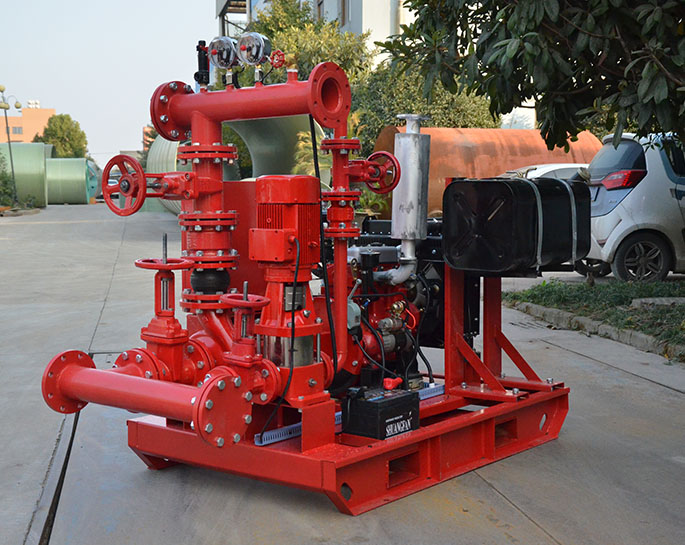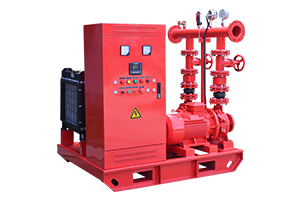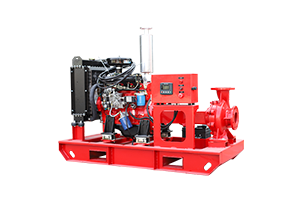Pump body material of fire pump
Aug 30, 2023
Share:
Fire pumps are critical components in fire protection systems, and the choice of pump body material is important to ensure reliability, durability, and performance under high-pressure and potentially harsh conditions. The materials used for fire pump bodies are typically selected based on factors like corrosion resistance, strength, and compatibility with the fluids being pumped. Common materials for fire pump bodies include:
Cast Iron: Cast iron is a widely used material for fire pump bodies due to its strength and durability. It's suitable for a range of applications and is relatively cost-effective. However, cast iron can be susceptible to corrosion in certain environments, so protective coatings are often applied.
Ductile Iron: Ductile iron, also known as nodular iron or cast iron with nodular graphite, is an improved version of cast iron. It offers greater tensile strength, impact resistance, and ductility compared to standard cast iron. Ductile iron is commonly used in high-pressure fire pump applications.
Bronze: Bronze is chosen for its excellent corrosion resistance, especially in marine and saltwater environments. It's also resistant to dezincification, making it suitable for fire pumps handling water containing impurities.
Stainless Steel: Stainless steel is highly corrosion-resistant and can withstand challenging environments. It's often used when pumping corrosive or chemically aggressive fluids. However, stainless steel can be more expensive than other materials.
Aluminum: Aluminum offers good corrosion resistance and is lightweight, making it a suitable choice for portable or mobile fire pumps. However, aluminum can have lower strength compared to other materials, so it might be used in specific applications.
Brass: Brass is used in some fire pump applications due to its corrosion resistance and ease of machining. However, it's not as commonly used as other materials like cast iron or bronze.
The specific material chosen for the fire pump body depends on factors such as the intended application, the types of fluids being pumped, the presence of corrosive elements, budget considerations, and regulatory requirements. Fire pump manufacturers typically provide recommendations and guidelines for selecting the appropriate pump body material based on these factors.
It's important to note that the pump body is not the only component of a fire pump system. Other components, such as impellers, shafts, seals, and bearings, also play critical roles, and their materials should be considered as well. When designing or selecting a fire pump system, consulting with professionals who specialize in fire protection and pump engineering is essential to ensure the chosen materials are suitable for the specific requirements of the application and comply with relevant standards and regulations.

Cast Iron: Cast iron is a widely used material for fire pump bodies due to its strength and durability. It's suitable for a range of applications and is relatively cost-effective. However, cast iron can be susceptible to corrosion in certain environments, so protective coatings are often applied.
Ductile Iron: Ductile iron, also known as nodular iron or cast iron with nodular graphite, is an improved version of cast iron. It offers greater tensile strength, impact resistance, and ductility compared to standard cast iron. Ductile iron is commonly used in high-pressure fire pump applications.
Bronze: Bronze is chosen for its excellent corrosion resistance, especially in marine and saltwater environments. It's also resistant to dezincification, making it suitable for fire pumps handling water containing impurities.
Stainless Steel: Stainless steel is highly corrosion-resistant and can withstand challenging environments. It's often used when pumping corrosive or chemically aggressive fluids. However, stainless steel can be more expensive than other materials.
Aluminum: Aluminum offers good corrosion resistance and is lightweight, making it a suitable choice for portable or mobile fire pumps. However, aluminum can have lower strength compared to other materials, so it might be used in specific applications.
Brass: Brass is used in some fire pump applications due to its corrosion resistance and ease of machining. However, it's not as commonly used as other materials like cast iron or bronze.
The specific material chosen for the fire pump body depends on factors such as the intended application, the types of fluids being pumped, the presence of corrosive elements, budget considerations, and regulatory requirements. Fire pump manufacturers typically provide recommendations and guidelines for selecting the appropriate pump body material based on these factors.
It's important to note that the pump body is not the only component of a fire pump system. Other components, such as impellers, shafts, seals, and bearings, also play critical roles, and their materials should be considered as well. When designing or selecting a fire pump system, consulting with professionals who specialize in fire protection and pump engineering is essential to ensure the chosen materials are suitable for the specific requirements of the application and comply with relevant standards and regulations.







